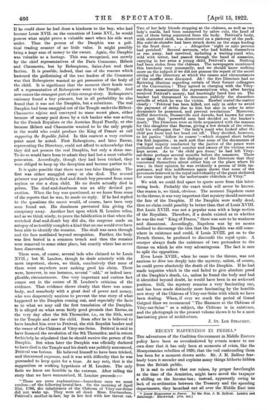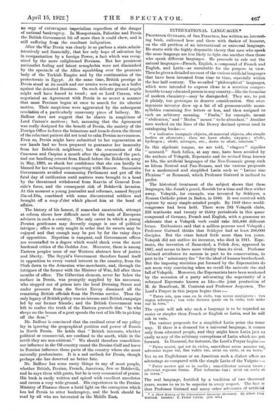RECENT HAPPENINGS IN PERSIA.* THE adventures of the Coalition Government
in Middle Eastern policy have been so overshadowed by events nearer to our own door that it has only been at moments of crisis, like the Mesopotamian rebellion of 1920, that the veil enshrouding them has been for a moment drawn aside. Mr. J. M. Balfour fear- lessly tears it asunder and explains many things hitherto hidden from the British public.
It is sad to reflect that our rulers, by proper forethought at the time of the Armistice, might have saved the taxpayer a shilling on the Income-tax ; instead, apparently owing to lack of co-ordination between the Treasury and the spending departments, they launched out all over the Middle East into
• Recent Happenings in Persia. By the Hon. 5. IL. Balfour. louden and Edinburgh: Blackwood. PM. aet-1
an orgy of extravagant imperialism regardless of the danger of national bankruptcy. In Mesopotamia, Palestine and Persia the British. Government bit off more than it could chew, and is still suffering from the resultant indigestion.
After the War Persia was clearly in so parlous a state, admin- istratively and financially, that her only hope of salvation lay in reorganization by a foreign Power, a fact which was recog- nized by the more enlightened Persians. But her persistent nationalist feeling and latent xenophobia were not diminished by the spectacle of the Allies squabbling over the prostrate body of the Turkish Empire and by the continuation of the protectorate in Egypt. At the same time, British prestige in Persia stood at its zenith and our armies were acting as a buffer against the detested Russians. On such delicate ground angels might well have feared to tread ; not so Lord Curzon, who negotiated an Agreement with Persia in so secret a manner that most Persians began at once to search for its ulterior motive. Their suspicions were aggravated by the subsequent revelation of a particularly unsavoury piece of bribery. Mr. Balfour does not suggest that he shares in suspicions of Lord Curzon's. motives ; but, assuming that the Agreement was really designed for the benefit of Persia, the anxiety of the Foreign Office to force the brimstone and treacle down the throat of the reluctant patient did not tend to calm Persian nervousness. Even so, Persia might have submitted to her regeneration at our hands had we been prepared to guarantee her immunity from her Bolshevik neighbour ; but the evacuation of the Caucasus and Caspian a month after the signature of the pact, and our headlong retreat from Enzeli before the Bolshevik army in May, 1920, so shook her confidence that she can hardly be blamed for her subsequent coquetting with Moscow. Successive Governments avoided summoning Parliament and put off the fatal day of ratification until matters were brought to a head by the threatened withdrawal from Kazvin of General Iron- side's force, and the consequent risk of Bolshevik invasion. At this moment a young journalist and reformer, named Seyyid Zia-ed-Din, combined with some discontented soldiers and brought off a coup cretat which placed him at the head of affairs.
The history of his honest, if somewhat amateurish, attempt at reform shows how difficult must be the task of European advisers in such a country. The only career in which a young Persian gentleman may decently engage is one of political intrigue ; office is only sought in order that its sweets may be enjoyed and that enough may be put by for the rainy days of opposition. Nepotism is rampant, and Government offices are overstaffed to a degree which would shock even the most hardened critics of the Geddes Axe. Moreover, there is among Eastern peoples none of our Western abstract love of justice and liberty. The Seyyid's Government therefore found itself in opposition to every vested interest in the country, from the Shah down to the Armenian wine-merchants, and, through the intrigues of the former with the Minister of War, fell after three months of office. The Gilbertian element, never far below the surface in Persia, was promptly supplied by his successor, who stepped out of prison into the local Downing Street and under pressure from the Soviet Envoy dismissed all the remaining British officials from the Persian service. Thus the only legacy of British policy was an intense anti-British campaign led by our former friends; and the British Government was left to realize the truth of the Eastern proverb that " he who sleeps on the bosom of a goat spends the rest of his life in picking off the fleas."
Mr. Balfour is convinced that the cardinal error of our policy lay in ignoring the geographical position and power of Russia in North Persia. He holds that " British interests, whether political or commercial, are confined to the south, while in the north they are non-existent." We should therefore consolidate our influence in the Oil country round the Persian Gulf and leave to Russian influence those parts of the country where she must naturally predominate. It is a sad outlook for Persia, though perhaps she has deserved no better fate.
Mr. Balfour has some nasty things to say of most people, whether British, Persian, French, American, Jew or Bolshevik, and he says them with gusto, but he is very economical of praise. His book is racily written and spiced with excellent anecdotes and covers a very wide ground. His experiences in the Persian Ministry of Finance throw a lurid light on the corruption which has led Persia to utter bankruptcy, and the book should be read by all who are interested in the Middle East.



































 Previous page
Previous page